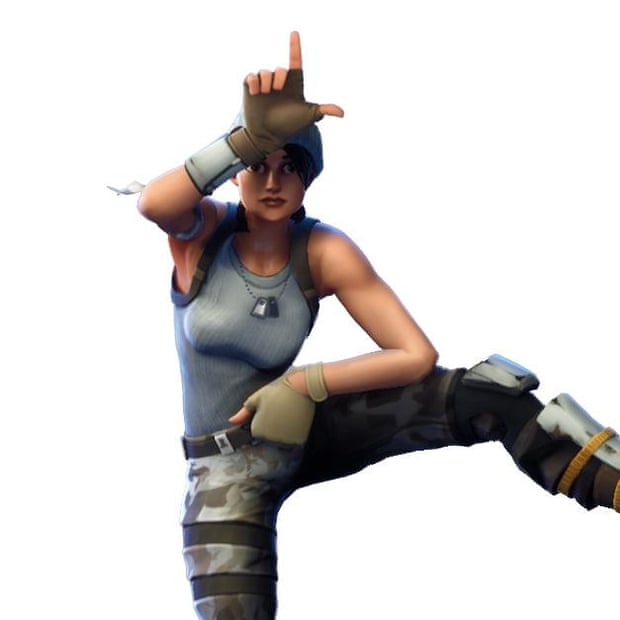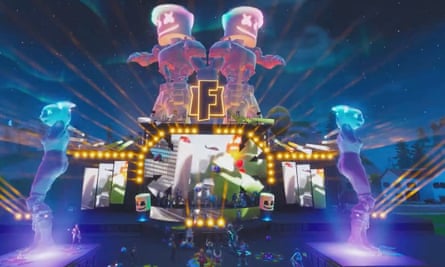The global phenomenon Fortnite recently attracted millions of fans to a virtual gig by the real-world DJ Marshmello and now songwriters and composers are seeking to use new copyright laws to receive their cut of royalties from music featured in the booming world of online gaming.
PRS for Music, the body that makes sure 140,000 songwriters, composers and publishers in the UK are paid when their music is used across the globe, has revealed that music royalties rose 4.4% to a record £746m last year.
The body collected royalties from 11.2tn “performances” of music, including streaming, downloads, plays on the radio or in TV broadcasts, as well as from music played in business premises or live gigs. It was a 70% increase on 2017.
With the spread of music usage across social media platforms commonplace, last year the music body brought in its first revenues from licensing deals with giants Facebook and Instagram.
Robert Ashcroft, the chief executive of PRS for Music, says he is looking at whether licensing deals should be struck for the use of music in what is referred to as massively multiplayer online games, such as the wildly popular phenomenon that is Fortnite, which has more than 250 million registered users worldwide.
In February almost 11 million Fortnite players had their in-game avatars attend a virtual concert by Marshmello staged in the virtual world.
Quick GuideWhat is Fortnite?
Show

What is Fortnite: Battle Royale
In short, it's a mass online brawl where 100 players leap out of a flying bus on to a small island and then fight until only one is left. Hidden around are weapons and traps, and players must arm themselves while exploring.
When was it released?
Fortnite started in July 2017 as a four-player cooperative survival game, but the game's developer, Epic, noticed the huge success of PC title PlayerUnknown's Battlegrounds (PUBG), which pits 100 players against each other, and decided to release a new version.
How much does it cost?
The game is free and players are able to unlock new items as they progress without paying anything. A Premium Battle Pass gives access to exclusive clothing and items. However there is an in-game currency, V-Bucks, which players can use to buy additional custom gear. It is how this currency is paid for that has become the centre of a dispute between Fortnite's makers and Apple and Google.
Why is it so popular with kids?
It's free, it's fun, and it has a very silly, offbeat sense of humour. While PUBG has a serious, realistic visual style, Fortnite: Battle Royale has very bright, almost cartoon-like graphics, as well as loads of ridiculous items and costumes, such as space suits and dinosaur outfits. Players can pull a variety of dance moves, and team up with a friend to compete as a duo or a squad. Participants can chat as they play using headsets and microphones.
Is there violence? And is it addictive?
Although Fortnite is a multiplayer shooter, it does not depict bloody violence. It takes lots of enjoyable gameplay concepts from more mature shooting games but places them in a non-threatening, non-realistic world. In terms of addictiveness, Fortnite contains nothing that makes it different from other action video games. It's more that the game contains many different elements – nice visuals, good shooting mechanics, an interesting building component and lots of support and interest from YouTubers – into one package that is free to download.
Ashcroft says that last month’s vote to approve the biggest change to European copyright law in nearly two decades has potentially opened the door for online gaming to be a source of music royalty revenue for the first time.
The new laws, bitterly opposed by the Silicon Valley giants Google and Facebook, mean that tech giants will have to seek licences from press publishers and the music industry to host and exploit their content online.
“We currently license a lot of digital services, like YouTube music, already anyway,” Ashcroft said. “It is really important for us to have a level playing field for these services that we don’t yet have licences, such as music used in the massive multiplayer online gaming market, like Fortnite. That is one of the areas we will be looking at. Does that fall within the new provisions of the law? Is that an opportunity [for licensing revenues]? [The new law] clarifies the liability of key technology platforms to pay for their use of copyright material.”

The digital revolution has proved to be of as much of a boon for music creators as it has been for fans, with royalty revenue from songs played on services such as Spotify and Apple Music climbing almost a fifth to £145.7m.
Global chart successes and major live world tours from PRS members including Ed Sheehan, U2 and the Rolling Stones helped fuel a 9% rise in international royalty income to £280.6m pounds last year. International royalty income, the largest revenue stream for PRS for Music, has grown by 43% over the past three years as Brit music continues to prove immensely popular overseas.
“Royalties from international and digital continue to underpin our growth,” Ashcroft said.
Income from music usage by broadcasters including the BBC, Sky and radio groups such as Global Radio, which owns networks including Capital, Heart and Radio X, fell 5% to £128m. This was primarily because of the decline in traditional TV viewing, meaning less royalty income a a result.
Store closures and the general malaise on the high street led to a small drop in royalty income from general business music usage, such as music played in stores, to £192m.
